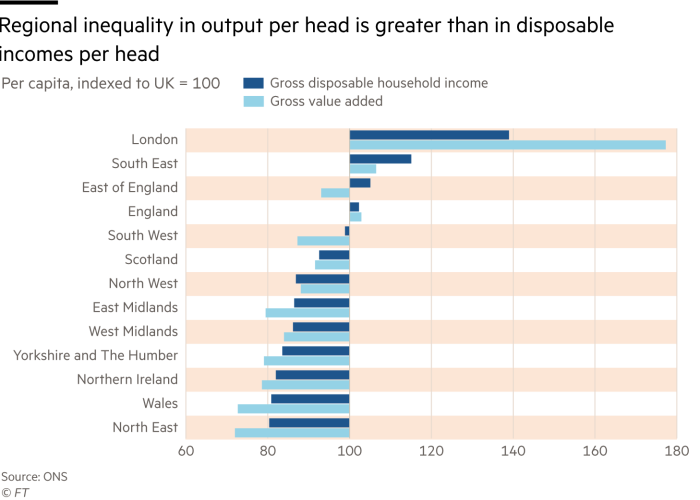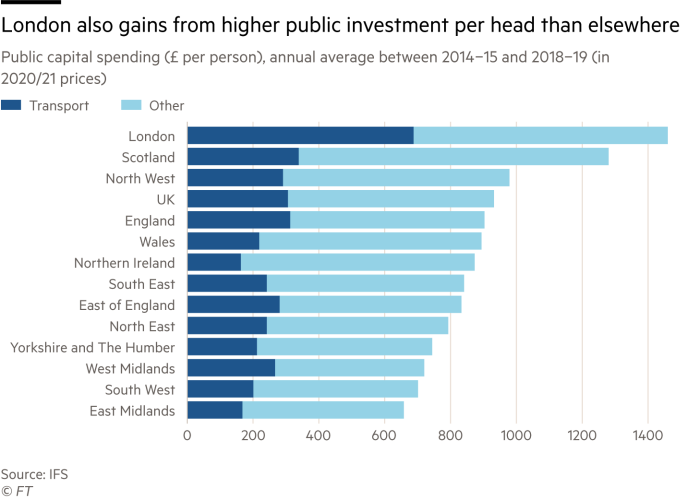The hinterland is in revolt. This has been a theme of a lot of the political commentary on the election of Donald Trump and the vote for Brexit in 2016. Within the UK, the concept has been additional cemented by the success of the Tories in successful seats lengthy loyal to Labour within the 2019 normal election — turning the “red wall” blue. Fairly instantly, what financial geographer Andrés Rodríguez-Pose calls the “locations that don’t matter” do: they’ve been on the forefront of those populist rebellions.
The UK authorities has promised a “levelling up” of those locations, as a technique to entrench the shift in political loyalties. The query, nevertheless, is whether or not the nation has a well-defined downside, with clear options. The reply, alas, is not any. It has neither. It would show far simpler to degree the economic system down, by destroying London. The indifference to the destiny of London’s service industries within the Brexit deal suggests the federal government would possibly even like to take action, although the deal’s impression on EU-destined exports of manufactures is prone to offset this.

The place to begin needs to be with an try to know the issue. This seems to be complicated, on no less than two dimensions: place versus individuals; and productiveness versus consumption. On the previous dyad, the query is whether or not one ought to care extra about locations or the individuals who presently stay there? On the latter, the query is whether or not we must always care extra about what individuals do or how they stay?
The excellence between productiveness and revenue is vital. A paper printed by the National Institute of Economic and Social Research final 12 months argued that the “UK at present is without doubt one of the most geographically unbalanced nations within the industrialised world”. Regional inequality in output per head is exceptionally giant within the UK, with London far above the remainder. This displays the advantages of agglomeration and the prices of deindustrialisation, strengthened by over-centralised governance.

But, maybe surprisingly, because the Resolution Foundation and others have identified, the distribution of actual family disposable incomes, earnings and employment is way much less regionally unequal than that of output per head. Furthermore, whereas regional inequality in output per head and per employee has tended to rise since 2000, that in earnings and employment fell, no less than pre-Covid-19.
That is due, partially, to the mix of upper minimal wages with greater employment — an actual success. Furthermore, housing prices are very regionally unequal. Thus, based on the Decision Basis, the regional variation in actual median family disposable incomes, after housing prices, was at its lowest for the reason that Nineteen Seventies, pre-pandemic. The UK additionally has pretty common regional inequality in household incomes amongst OECD members.
Suppose, fairly moderately, we care extra about individuals than locations and consumption than output. We might conclude there isn’t any large downside of regional inequality as such. The issue is poverty, which is a crucial concern all over the place, together with London, with its excessive price of housing and low actual incomes for these depending on minimal wages or state advantages.
The answer to poverty is for the federal government to supply sources wanted for good training, well being providers, native authorities providers and welfare help, all over the place. It was a mistake to slash cash for native authorities, particularly in poorer areas, and to chop spending on funding and welfare, within the austerity programmes imposed by the federal government after the monetary disaster.

But this doesn’t imply regional inequality in productiveness needs to be ignored, for 3 causes. First, redistributing cash from rich areas to poorer ones, to be able to equalise consumption, is a burden on the previous and one which the post-Brexit UK could also be much less in a position to afford. Second, the focus of extremely educated individuals in a comparatively small a part of the nation divides it culturally, in a really unlucky approach.
Lastly, and most significantly, because the Niesr paper persuasively argues, a big economic system can not fly quick on only one regional engine. The paper’s most essential discovering is that the UK has only one large high-productivity metropolis and plenty of low-productivity ones. Regardless of their dimension, these cities are not any extra productive than the areas round them.
Coverage should due to this fact concentrate on growing what the late urbanist Jane Jacobs referred to as “city-regions”. These have to be granted the autonomy and sources wanted to create their very own improvement paths. The goal have to be to assist the UK’s city-regions develop themselves, however London have to be allowed to develop, too. The nation will want all its development engines within the years forward.








